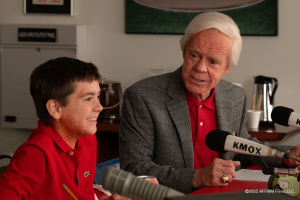Louisiana becomes first state to require Ten Commandments display in public school classrooms

Louisiana became the first state to require public school classrooms to display the Ten Commandments through a Republican-backed bill signed by Republican Gov. Jeff Landry on Wednesday.
House Bill 71, sponsored by Republican Rep. Dodie Horton, mandates that each public school classroom display a poster-sized copy of the Ten Commandments by next January. The Ten Commandments, as found in the Old Testament books of Exodus 20 and Deuteronomy 5, are a set of ethical rules handed down by God to Moses.
"If you want to respect the rule of law you've got to start from the original law given, which was Moses," Landry said during a signing ceremony Wednesday.
The display must be a “poster or framed document that is at least eleven inches by fourteen inches,” according to the text of the legislation. The text of the Ten Commandments must be the “central focus” of the poster or framed documents, which shall be printed in “large, easily readable font.”
The display must also include a four-paragraph “context statement” telling readers that “The Ten Commandments were a prominent part of American public education for almost three centuries.”
“Around the year 1688, The New England Primer became the first published American textbook and was the equivalent of a first grade reader. The New England Primer was used in public schools throughout the United States for more than one hundred fifty years to teach Americans to read and contained more than forty questions about the Ten Commandments,” the context statement reads.
“The Ten Commandments were also included in public school textbooks published by educator William McGuffey, a noted university president and professor. A version of his famous McGuffey Readers was written in the early 1800s and became one of the most popular textbooks in the history of American education, selling more than one hundred million copies. Copies of the McGuffey Readers are still available today.”
The new law is likely to face legal challenges. Secular church-state separation groups have already threatened lawsuits, contending that it violates the U.S. Constitution’s Establishment Clause of the First Amendment.
The American Civil Liberties Union, the ACLU of Louisiana, Americans United for Separation of Church and State and the Freedom from Religion Foundation announced their intention to file a lawsuit.
The groups assert that school displays of the Ten Commandments equate to “religious coercion of students, who are legally required to attend school and are thus a captive audience for school-sponsored religious messages.”
The organizations believe the law violates U.S. Supreme Court precedent set in the 1980 Stone v. Graham decision. In a 5-4 ruling, the Burger court ruled against a similar law passed in Kentucky requiring classrooms to post copies of the Ten Commandments, finding that it violated the First Amendment.
"The law violates the separation of church and state and is blatantly unconstitutional,” the groups wrote in a joint statement. “The First Amendment promises that we all get to decide for ourselves what religious beliefs, if any, to hold and practice, without pressure from the government. Politicians have no business imposing their preferred religious doctrine on students and families in public schools.”
Supporters of the law maintain that its purpose is to highlight the document’s historical significance, as the legislation describes the Ten Commandments as one of the "foundational documents of our state and national government."
The bill also allows schools to display other historical documents, such as the Mayflower Compact, the Declaration of Independence and the Northwest Ordinance.
“Although this is a religious document, this document is also posted in over one hundred and eighty places, including the Supreme Court of the United States of America. I would say is based on the laws that this country was founded on,” Republican state Sen. Adam Bass told KALB last month.
Matt Krause, a lawyer with the religious liberty law firm First Liberty Institue, said the new law recognizes "the history and tradition of the Ten Commandments in the state."
“Putting this historic document on schoolhouse walls is a great way to remind students of the foundations of American and Louisiana law," Krause, who testified in support of a similar bill in Ohio, stated. "First Liberty was grateful to play a part in helping this bill reach the Governor’s desk. We applaud Louisiana for being the first, but by no means the last, state to take this bold step for religious liberty.”



























